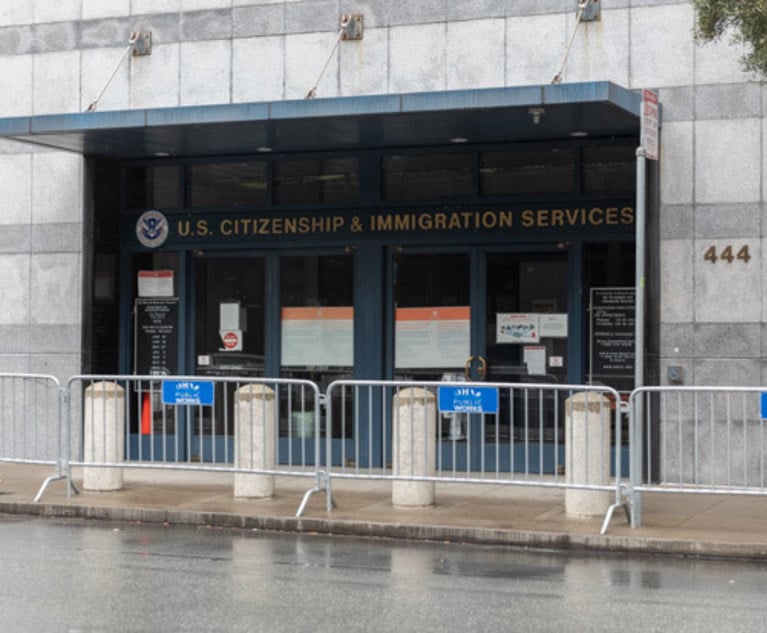 Shari Klevens (left) and Alanna Clair, Dentons. (Courtesy photo)
Shari Klevens (left) and Alanna Clair, Dentons. (Courtesy photo)Shhhh: Complying With Confidentiality Clauses in Settlement Agreements
Regardless of when the settlement occurs, the terms of a settlement can lead to ramifications long after the case is dismissed.
February 24, 2020 at 12:38 PM
7 minute read
Less than 3% of civil cases reach a trial verdict. While some cases are dismissed by the court or a party, the majority of civil litigations are settled by mutual agreement between the parties. As a result, almost all parties to civil litigation likely will be faced at some point with the decision to settle their dispute and, if so, under what terms. A settlement can occur before a suit is filed, after a suit is filed, before the trial begins, during the trial or even after a verdict is rendered.
Regardless of when the settlement occurs, the terms of a settlement can lead to ramifications long after the case is dismissed. One term that parties and attorneys will often discuss at length is whether to include a confidentiality clause. For some, confidentiality is a necessary term for any settlement, while others may want the right to discuss the terms or conditions of settlement publicly.
Confidentiality clauses in settlement agreements present unique risks to both attorneys and their clients. Where an agreement contains a strict confidentiality clause, there can be almost interminable obligations on parties and their lawyers. Keeping the below considerations in mind, attorneys can work to meet client expectations while maintaining their ethical obligations under the Rules of Professional Conduct.
Considerations for Clients
Whether to include a confidentiality provision in a settlement is generally considered to be the client's decision to make, with the advice of counsel. Confidentiality can be a bargaining chip like any other in negotiations.
A client may prefer a confidential settlement for a variety of reasons. For example, defendants may want a confidential settlement so as not to encourage additional claims or impair their reputation due to the perception of guilt that could accompany a settlement. The common perception is that plaintiffs most often do not seek out a confidential settlement, but plaintiffs may agree to a confidentiality provision because they want to get the matter resolved or because they do not want the details of the settlement (such as their claimed harm or amount of money they received) to be public knowledge.
The specific circumstances of the settlement may guide the attorney and the client when considering the scope or application of any confidentiality provision as a requisite for settlement.
Considerations for Attorneys
Confidentiality clauses in settlement agreements can include a range of restrictions. Many confidentiality provisions will prohibit the parties from revealing the terms of the settlement. Others may go further, to preclude disclosure of the nature of the dispute, the facts underlying the claims and any discovery exchanged. While many states have enforced confidential settlements that preclude counsel from disclosing specific terms of settlement, various state bar associations have issued ethics opinions prohibiting settling parties from agreeing to keep confidential information already in the public record.
Another issue relates to determining who is "bound" by a confidentiality clause. Settlement agreements are generally signed only by the parties in dispute. Still, if the agreement defines a "party" to include agents and representatives, that could be read to create binding obligations on the party's attorneys. Therefore, even if not a direct party to the settlement agreement, an attorney may be bound by the confidentiality provisions as an agent of the client, in addition to the attorney's general obligation to maintain client confidences under the ethical rules.
The terms of a settlement agreement may also conflict with the Rules of Professional Conduct by creating obligations that are not sustainable at law. For instance, Rule 5.6(b) of the Georgia Rules of Professional Conduct prohibits attorneys from offering or making a settlement agreement that restricts an attorney's right to practice. The comments to the rule explain that this prohibition includes an attorney "agreeing not to represent other persons in connection with settling a claim on behalf of a client." Multiple state bar associations have also released ethics opinions indicating that Rule 5.6 prohibits not only express restrictions on an attorney's right to practice, but also settlement terms whose practical effect is to restrict the attorney from undertaking future representations.
Risks of Breaching Confidentiality Clauses
Even a mistaken breach of a confidentiality provision can lead to damages, whether the breach is a result of the conduct of the client or the attorney. Therefore, many attorneys discuss with their clients the importance in complying with the confidentiality provisions of the settlement agreement, particularly in the age of social media. In situations where a large number of client representatives have knowledge of a settlement, it may be advisable to incorporate terms into the agreement whereby only a disclosure of particular detailed settlement terms can be deemed a violation of the agreement. Otherwise, upon a breach, the breaching party could be required to return any settlement proceeds or to pay other damages.
Because proof of damages for breach of confidentiality tends to be difficult, settlement agreements may specify remedies including monetary liquidated damages, injunctive relief, costs and/or attorneys' fees.
Handling Limited Disclosure
There is generally an exception to confidentiality where disclosure is required by law or demanded by subpoena in another judicial proceeding. Many settlement agreements will specifically address what should happen if confidential settlement information is demanded by subpoena or otherwise required by law, including by offering the nonsubpoenaed party an opportunity to object to the disclosure of information.
Even where settlements are confidential, parties will often agree that the terms of settlement can be disclosed to party's attorneys, accountants, insurance companies and other professional advisors, as necessary for business purposes.
Considerations for Changing Standards
In response to the #MeToo Movement, a number of states have enacted legislation aimed at prohibiting employers from using nondisclosure provisions in settlement agreements that resolve allegations of sexual harassment, discrimination, and other forms of harassment. These changes are indicative of how public policies can have an impact on the law. Further, these developments highlight the importance of keeping apprised of the changing standards and statutes that can influence the structuring of settlements (and, sometimes, the ultimate decision of whether to settle claims).
Notwithstanding the risks, confidential settlement agreements can protect a client's interests and lead to a favorable result for all parties involved. By being aware of the ethical risks, attorneys can help ensure that a dispute does not get reanimated after its resolution.
Shari L. Klevens is a partner at Dentons in Atlanta and Washington, D.C., and serves on the firm's U.S. board of directors. She represents and advises lawyers and insurers on complex claims and is co-chair of Dentons' global insurance sector team.
Alanna Clair, also a partner at the firm in Washington, focuses on professional liability and insurance defense. Klevens and Clair are co-authors of "The Lawyer's Handbook: Ethics Compliance and Claim Avoidance" and the 2020 edition of "Georgia Legal Malpractice Law."
This content has been archived. It is available through our partners, LexisNexis® and Bloomberg Law.
To view this content, please continue to their sites.
Not a Lexis Subscriber?
Subscribe Now
Not a Bloomberg Law Subscriber?
Subscribe Now
NOT FOR REPRINT
© 2024 ALM Global, LLC, All Rights Reserved. Request academic re-use from www.copyright.com. All other uses, submit a request to [email protected]. For more information visit Asset & Logo Licensing.
You Might Like
View All

Walking a Minute in Your Adversary’s Shoes: Addressing the Issue of 'Naive Realism' at Mediation
5 minute read
Anticipating a New Era of 'Extreme Vetting,' Big Law Immigration Attys Prep for Demand Surge
6 minute read
On The Move: Polsinelli Adds Health Care Litigator in Nashville, Ex-SEC Enforcer Joins BCLP in Atlanta
6 minute readLaw Firms Mentioned
Trending Stories
Who Got The Work
Michael G. Bongiorno, Andrew Scott Dulberg and Elizabeth E. Driscoll from Wilmer Cutler Pickering Hale and Dorr have stepped in to represent Symbotic Inc., an A.I.-enabled technology platform that focuses on increasing supply chain efficiency, and other defendants in a pending shareholder derivative lawsuit. The case, filed Oct. 2 in Massachusetts District Court by the Brown Law Firm on behalf of Stephen Austen, accuses certain officers and directors of misleading investors in regard to Symbotic's potential for margin growth by failing to disclose that the company was not equipped to timely deploy its systems or manage expenses through project delays. The case, assigned to U.S. District Judge Nathaniel M. Gorton, is 1:24-cv-12522, Austen v. Cohen et al.
Who Got The Work
Edmund Polubinski and Marie Killmond of Davis Polk & Wardwell have entered appearances for data platform software development company MongoDB and other defendants in a pending shareholder derivative lawsuit. The action, filed Oct. 7 in New York Southern District Court by the Brown Law Firm, accuses the company's directors and/or officers of falsely expressing confidence in the company’s restructuring of its sales incentive plan and downplaying the severity of decreases in its upfront commitments. The case is 1:24-cv-07594, Roy v. Ittycheria et al.
Who Got The Work
Amy O. Bruchs and Kurt F. Ellison of Michael Best & Friedrich have entered appearances for Epic Systems Corp. in a pending employment discrimination lawsuit. The suit was filed Sept. 7 in Wisconsin Western District Court by Levine Eisberner LLC and Siri & Glimstad on behalf of a project manager who claims that he was wrongfully terminated after applying for a religious exemption to the defendant's COVID-19 vaccine mandate. The case, assigned to U.S. Magistrate Judge Anita Marie Boor, is 3:24-cv-00630, Secker, Nathan v. Epic Systems Corporation.
Who Got The Work
David X. Sullivan, Thomas J. Finn and Gregory A. Hall from McCarter & English have entered appearances for Sunrun Installation Services in a pending civil rights lawsuit. The complaint was filed Sept. 4 in Connecticut District Court by attorney Robert M. Berke on behalf of former employee George Edward Steins, who was arrested and charged with employing an unregistered home improvement salesperson. The complaint alleges that had Sunrun informed the Connecticut Department of Consumer Protection that the plaintiff's employment had ended in 2017 and that he no longer held Sunrun's home improvement contractor license, he would not have been hit with charges, which were dismissed in May 2024. The case, assigned to U.S. District Judge Jeffrey A. Meyer, is 3:24-cv-01423, Steins v. Sunrun, Inc. et al.
Who Got The Work
Greenberg Traurig shareholder Joshua L. Raskin has entered an appearance for boohoo.com UK Ltd. in a pending patent infringement lawsuit. The suit, filed Sept. 3 in Texas Eastern District Court by Rozier Hardt McDonough on behalf of Alto Dynamics, asserts five patents related to an online shopping platform. The case, assigned to U.S. District Judge Rodney Gilstrap, is 2:24-cv-00719, Alto Dynamics, LLC v. boohoo.com UK Limited.
Featured Firms
Law Offices of Gary Martin Hays & Associates, P.C.
(470) 294-1674
Law Offices of Mark E. Salomone
(857) 444-6468
Smith & Hassler
(713) 739-1250






